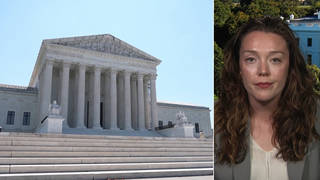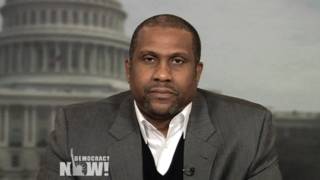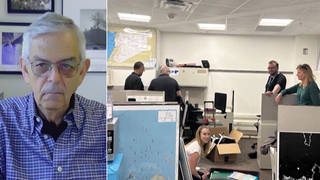
Guests
- Cathy Cohenprofessor of political science at the University of Chicago and founder of the Black Youth Project.
- Bob Herberta distinguished senior fellow with Demos. From 1993 to 2011, he was an op-ed columnist for The New York Times.
Links
President Obama opened his State of the Union with a call to revive the middle class and with a challenge to a divided Congress to back his economic proposals to create jobs. We get reaction from Bob Herbert, distinguished senior fellow with Demos, and Cathy Cohen, professor of political science at the University of Chicago and founder of the Black Youth Project. “Median income in the United States has gone down since the recession ended,” Herbert says. “Poverty is expanding. We have nearly 50 million people who are officially poor in this country and another 50 million who are near poor. … You’re getting close to a third of the entire population. So, there is no way to address challenges that are that enormous without making enormous investments.” [includes rush transcript]
Transcript
NERMEEN SHAIKH: President Obama opened his State of the Union with a call to revive the middle class. He challenged a divided Congress to back his economic proposals to create jobs.
PRESIDENT BARACK OBAMA: After years of grueling recession, our businesses have created over six million new jobs. We buy more American cars than we have in five years and less foreign oil than we have in 20. Our housing market is healing. Our stock market is rebounding. And consumers, patients and homeowners enjoy stronger protections than ever before. So, together, we have cleared away the rubble of crisis, and we can say with renewed confidence that the state of our union is stronger.
But—but we gather here knowing that there are millions of Americans whose hard work and dedication have not yet been rewarded. Our economy is adding jobs, but too many people still can’t find full-time employment. Corporate profits have skyrocketed to all-time highs, but for more than a decade, wages and incomes have barely budged.
It is our generation’s task, then, to reignite the true engine of America’s economic growth: a rising, thriving middle class. It is—it is our unfinished task to restore the basic bargain that built this country, the idea that if you work hard and meet your responsibilities, you can get ahead, no matter where you come from, no matter what you look like or who you love.
AMY GOODMAN: That’s President Obama in his State of the Union address. Still with us, Bob Herbert, distinguished senior fellow at Demos, and Cathy Cohen, professor of political science, University of Chicago, founder of the Black Youth Project. Your response to President Obama?
BOB HERBERT: Well, I do agree that the unfinished task is to make sure that people who work hard and take care of their responsibilities can get ahead, but he has not—and neither has anyone in Congress—laid out how we’re going to get there. The big problem—the biggest problem facing the country still is employment: too many people out of work and too many people underemployed. Now, the president touched on some of the things that we need to do. We need to rebuild infrastructure, invest in research and development. He talked about some things related to climate change, you know, weatherizing buildings from coast to coast, which would put lower-income people to work. But all of those things cost money. And he also emphasized in his speech that nothing that he’s proposing will add even a dime to the budget deficits. So, one part of the speech is fighting another, so I don’t know how we make headway here, if we’re not going to make investments in those things that ultimately will put people back to work.
NERMEEN SHAIKH: And, Bob Herbert, you pointed out a report that was recently brought out by Berkeley economics professor, Saez, that found that the top 1 percent captured 121 percent of all income gains between 2009 and 2011. To what extent do you think President Obama’s speech addressed this imbalance?
BOB HERBERT: Well, he mentioned it, but he doesn’t really address it. And if you have the top 1 percent getting 121 percent of the income gains, it meets that standards of living for the rest are declining. And that’s exactly what’s been happening. Median income in the United States has gone down since the recession ended; in the recovery period, median income has gone down. Poverty is expanding. We have nearly 50 million people who are officially poor in this country and another 50 million who are near poor. That’s close to—you’re getting close to a third of the entire population. So, there is no way to address challenges that are that enormous without making enormous investments, and yet we’re in a period now of austerity. So, I’m not sure how you begin to slice through the gloom here.
AMY GOODMAN: Let’s talk about the minimum wage. President Obama called on Congress to raise the federal minimum wage from $7.25 and to automatically adjust it with inflation.
PRESIDENT BARACK OBAMA: Tonight, let’s declare that in the wealthiest nation on earth, no one who works full-time should have to live in poverty, and raise the federal minimum wage to $9.00 an hour. We should be able to get that done. This single step would raise the incomes of millions of working families. It could mean the difference between groceries or the food bank, rent or eviction, scraping by or finally getting ahead. For businesses across the country, it would mean customers with more money in their pockets. And a whole lot of folks out there would probably need less help from government. In fact, working folks shouldn’t have to wait year after year for the minimum wage to go up, while CEO pay has never been higher. So here’s an idea that Governor Romney and I actually agreed on last year: Let’s tie the minimum wage to the cost of living, so that it finally becomes a wage you can live on.
AMY GOODMAN: Professor Cohen, how significant is this call?
CATHY COHEN: Well, I think it’s critical that the president attached himself to an increase in the minimum wage. I mean, the concern here is that in fact there is other legislation that has been offered that puts the minimum wage at $10, in some cases $10.10 an hour, and so we see a kind of backtracking on the part of the president, at a very low level, to say $9 an hour. So I’m not sure that’s a real kind of ladder to the middle class. But, in fact, it’s an increase.
But I think it actually speaks to a kind of glaring absence in the president’s State of the Union, which is a real discussion and a serious discussion of poverty in this country. You know, we talk about kind of aspiring to the middle class, expanding the middle class—these are all good things for us to be focused on. But there are, as Bob said, almost a third of the country who are impoverished or close to poverty. And we have to have a kind of clearer sense about what we’re going to do for those communities, for those individuals, to really kind of change their lives and provide them with kind of real opportunities for mobility.
NERMEEN SHAIKH: Bob Herbert, some critics have also pointed out that in 2008 President Obama, during his election campaign, had promised to raise the minimum wage to $9.50—
BOB HERBERT: Right.
NERMEEN SHAIKH: —which, of course, never occurred. But you were speaking earlier about some—about median income. Can you talk about the discrepancies in median income in the U.S. across race and class?
BOB HERBERT: Sure. You know, one of the things that’s not talked about very much is that so many of the people who are at the bottom of the socioeconomic ladder are racial and ethnic minorities. And if you look at African Americans, for example, I believe Pew says that the median household income for African Americans is around $5,000. So that’s really like no money at all. That would include the money that you had in the bank, perhaps the value of your car, if you had any equity at all in your home. I was up at Brandeis University a few months ago at a seminar on poverty, where one of the people presenting was talking about the median wealth of single African-American women with children under the age of 18, and their median wealth is $1. I mean, that is just really crazy.
AMY GOODMAN: Explain wealth, $1.
BOB HERBERT: Wealth as opposed to income. So, wealth would include any money that you might have in a bank, any assets you would have, stocks and bonds, the value of your home, etc., etc. So if you—cumulatively, the median for that group that they were talking about is $1. That’s basically no money at all. And that—the median is right there at the middle, so that means 50 percent of that group, the median wealth is less than $1. So, you know, it’s almost impossible to survive there.
But if I you—if I could just make a comment on the minimum wage, it is important to raise the minimum wage. You know, we’ve talked for decades about the importance of manufacturing jobs in creating the middle class in that post-World War II era. And, you know, people have lamented the loss of those so-called good jobs. But if you recall, historically, those good jobs were not always good jobs. The people who worked in the steel mills and the auto plants and in the mines, they were terrible jobs. They were dangerous. They were low pay, low-paying. And what happened, because of government support in some cases, but especially because of the support of labor unions, those lousy jobs at the time were transformed into very important, good jobs that did build the American middle class. We can do the same thing with low-wage service jobs in this country now. We can turn those jobs by increasing the support and the pay for those jobs—we can turn them into jobs that can begin to rebuild the middle class.
AMY GOODMAN: Let’s talk for a minute about what causes people to go bankrupt and become impoverished: healthcare. President Obama said last night the biggest driver of the nation’s long-term debt is the rising cost of healthcare for an aging population. He said he would protect the decades-old federal program of Medicare but was open to reforms.
PRESIDENT BARACK OBAMA: On Medicare, I’m prepared to enact reforms that will achieve the same amount of healthcare savings by the beginning of the next decade as the reforms proposed by the bipartisan Simpson-Bowles commission. Already, the Affordable Care Act is helping to slow the growth of healthcare costs. And the reforms I’m proposing go even further. We’ll reduce taxpayer subsidies to prescription drug companies and ask more from the wealthiest seniors. We’ll bring down costs by changing the way our government pays for Medicare, because our medical bills shouldn’t be based on the number of tests ordered or days spent in the hospital; they should be based on the quality of care that our seniors receive. And I am open to additional reforms from both parties, so long as they don’t violate the guarantee of a secure retirement.
AMY GOODMAN: That was President Obama. What is he signaling, Bob Herbert?
BOB HERBERT: Well, he’s signaling that, you know, he wants to do something about the rising cost of Medicare. And, you know, he wasn’t specific at all, but, you know, it sends a chill through me. As far as I’m concerned, the last thing that you want to do now is attack Medicare or attack Social Security. What I really wanted all along was an expansion of Medicare, so you get the type of coverage that Medicare provides to more and more—more and more Americans. So, to begin to pull back on that is kind of frightening. But he wasn’t very specific, so, you know, I can’t be sure what he was talking about.
NERMEEN SHAIKH: Another issue that President Obama addressed last night was climate change. During his speech, he heartened environmentalists with one of the strongest presidential statements on the topic in history.
PRESIDENT BARACK OBAMA: But for the sake of our children and our future, we must do more to combat climate change. Now—now, it’s true that no single event makes a trend. But the fact is, the 12 hottest years on record have all come in the last 15. Heat waves, droughts, wildfires, floods—all are now more frequent and more intense. We can choose to believe that Superstorm Sandy and the most severe drought in decades and the worst wildfires some states have ever seen were all just a freak coincidence, or we can choose to believe in the overwhelming judgment of science and act before it’s too late.
Now, the good news is, we can make meaningful progress on this issue while driving strong economic growth. I urge this Congress to get together, pursue a bipartisan, market-based solution to climate change, like the one John McCain and Joe Lieberman worked on together a few years ago. But if Congress won’t act soon to protect future generations, I will. I will direct—I will direct my Cabinet to come up with executive actions we can take, now and in the future, to reduce pollution, prepare our communities for the consequences of climate change, and speed the transition to more sustainable sources of energy.
NERMEEN SHAIKH: President Obama, speaking last night on climate change. Some environmentalists, of course, were disappointed that he didn’t go further and call for binding emissions cuts, carbon emission cuts—
BOB HERBERT: Right.
NERMEEN SHAIKH: —and other issues. Could you—could you comment on?
BOB HERBERT: Sure. Climate change is where, in my view, necessity and opportunity meet. We have to do something about climate change. We see what’s happening all around us, the deniers notwithstanding—I mean, that’s a Looney Tunes group as far as I’m concerned. But this also is the—sort of the pathway to the future, it would seem to me, in terms of the economy and other aspects of the challenges facing the United States. If we were to address climate change the way we addressed the challenge of, you know, something like World War II, and we said, “We have to do something about this. We’re going to put people to work. We’re going to do research and development. We’re going to do conservation. We’re going to weatherize buildings from coast to coast,” and that sort of thing, the United States could become the world leader in this climate change issue. We begin to develop new products, new automobiles, new forms of energy, and that sort of thing, which become the driving force for industry, going forward, which is another way to revitalize the economy and put people back to work.
So we should be bringing together the brightest minds in this country for an absolute, long-term campaign to fight climate change. You know, make it like, you know, the moon shot or as if we’re going to Mars or—the cliché is a new Marshall Plan, but sometimes clichés are appropriate, you know. So I believe that that’s the route we ought to be following at this point. But it would also require a tremendous amount of investment, so we’d have to figure out how we’re going to pay for these investments.
AMY GOODMAN: And finally, the issue of responsibility, Wall Street versus Main Street. Who pays for the crisis we’re in, and who doesn’t?
BOB HERBERT: Well, one of the things that has been problematic, and it’s the reason we have this imbalance of wealth and income in the country, is that the sacrifices that we’ve gone through as a result of our economic problems have not been properly shared. You know, most people’s standards of living are declining, while the folks at the top are doing great. What I think is that we should be raising taxes—this is really heresy, but I think that we should be raising taxes on everyone, because we do need to raise the revenue to make these investments, these long-term investments that are required. But, of course, I think that the taxes on those near the top ought to be raised much more than on middle-income or lower-income people. But this is not an issue that has any kind of political resonance in Washington.
AMY GOODMAN: Well, Bob Herbert, we want to thank you for being with us, as well as Cathy Cohen, professor at University of Chicago, founder of the Black Youth Project. And we’ll certainly follow up when President Obama goes to Chicago on Friday. Bob Herbert, distinguished senior fellow with Demos.
This is Democracy Now! When we come back, Kathy Kelly joins us from Chicago, just back from Afghanistan, to respond to President Obama’s statements about war. Stay with us.












Media Options